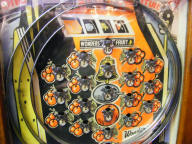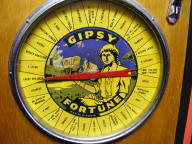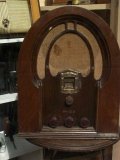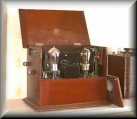'Umms' is the technical production term for (1) an actor's reactions while another (scene partner)
is speaking, and so (2) establishing presence as needed.
The director asks: 'Could you give me some 'umms' during that?'.
| DIRECTOR & ACTOR: You need to get the characters' presence into the scene. 'Umms' are applied here to those scene partners listening, in those moments while another character is speaking. |
| ACTOR: You have to 'stay in' or 'keep in' (keep presence for the listeners) when your character is listening to a scene partner speaking. It's a combination of skills. |
| ACTOR: (1) Sometimes you vocalise and make use of 'umms'. (2) Most often, you let the listeners know that your character is listening, even though you are silent. You are breathing and concentrated on the interaction. |
 |
| ACTOR: The focus for the listener is on the speaking character. But you (as listening character) have to avoid lifeless 'stand-and-deliver' acting by 'umms' OR silent presence. Radio drama is a miniaturist art, and a small touch, an inbreath by a character, can do a lot. |
| ACTOR: Even though your script is in your hand, you have to concentrate on what your scene partner is saying and doing. You support your scene partner through your engaged attention. That is the skill of 'staying in'. As in stage acting, the advice is to concentrate, as though hearing the lines for the first time. |
| 'Umms' means not just the 'umm', and 'aha', and shock and taking-it-in, but also breathing (inbreaths and outbreaths - there is a difference), giggling, laughter, horror reactions etc. |
| 'Umms' is a skilled technique. The actor has to learn the skill of (1) having this range of 'umms', and (2) how these sound in the broadcast product (FEEDBACK INFORMATION FOR THE ACTOR). |
| ACTOR: Learn the difference between inbreaths and outbreaths, and for your character, and in this scene. This gets you into the detail of your radio acting. |
 |
See an example of 'umms' in use in 'The Canterbury Vampires', Episode 7 Scene 3
| DIRECTOR: 'Umms' is a professional term in radio drama production. The director asks: 'Could you give me some 'umms' during that?'. The actor must respond by just the right number and range of 'umms'. An actor, when starting out, often exaggerates 'umms', and has to be encouraged to rein back. |
| DIRECTOR: Do not specifically ask for reactions, unless you need them. There is a danger 'umms' will be artificial if you ask for them. But get the PRODUCT you need. Get the presence and interaction you need. (Avoid lifeless 'stand-and-deliver' acting.) |
 |
| POSTPRODUCTION: A store of individal actor's 'umms' are needed to add to the dialogue in postproduction. SEE BELOW |
| 'Umms' technique is needed especially in moving sound centre - 'we go with' - characters on the move |
 |
| DIRECTOR & ACTOR: Sometimes the focus of attention can be the listening character, when that is demanded by the script. A crucial line is said. The listening character is deeply affected by this - a revelation? an emotional secret? a key bit of plot in a thriller? It is over to the actor to convey a reaction. This is an intensified moment. See INTENSIFYING THE MOMENT - discover the intense moments within your scenes |
Record 'umms' and reactions from all the characters to store in SOUND BOX - production sound effects archive
| PRODUCTION: As you record, make sure you collect these 'umms' from the characters. |
| POSTPRODUCTION: Your aim is to create 'presence' and movement in dialogue through post-production additions. |
| You particularly need inbreaths and outbreaths from each of the main characters. You will discover that you can use them flexibly. |
| POSTPRODUCTION: Divide these 'umms' into categories, such as 'male adult inbreath', 'female adulescent outbreath', etc. And they can be used across different adult characters, teenagers, children, etc. All depends on context, and on what sounds right for you in post-production. |
| POSTPRODUCTION: You will not create presence and energy in post-production alone. There is a danger that these added 'umms' may sound artificial. You depend on the quality of what the actors have given you in PRODUCTION. Your approach is similar to the creation of the film sound-track, where so much is done in POSTPRODUCTION.You need to have all these resources. |

|
EXAMPLE: Anthony
Minghella's 'Cigarettes and Chocolate' (first broadcast on BBC
Radio 4 in 1988) The main character is silent throughout most of the play. Finally, she speaks in a monologue, and explains she has given up a succession of things: 'The silence is beautiful. Last year it was cigarettes. The year before chocolate. But this is the best.' The actress play this role has to 'stay in' for most of the play, while scene partners speak at her. For a full explanation, see Alan Beck, Radio Acting. |

SEE Radio drama dialogue is much more than the words on the page.
SEE Getting PRESENCE into the scene - the sense of a character being 'in'

CONTINUING THROUGH THE SITE: to scene structure
|
|
||
|
|
|
|
|
|
|
|
|
|
|
'moving camera' technique |
|
|
|
'Will you turn that music down!' |
| drop-ins | sound pictures |
|
| number the scenes carefully with a system | voice in the mind = interiorizing |
|
|
|



